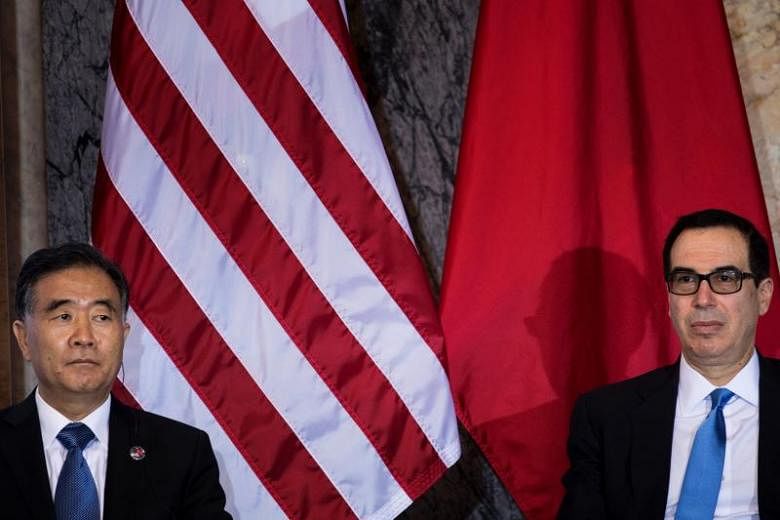WASHINGTON - An outward show of friendly intent masked an uneasy first session of the US-China Comprehensive Economic Dialogue (CED) in Washington on Wednesday (July 19), in which trade tensions surfaced despite some early deals in recent months over American beef, soy beans and natural gas, and Chinese poultry.
Earlier scheduled press conferences by both sides were cancelled in the morning without explanation, raising worries among analysts.
Shares of US steel companies rose on expectations that tariffs or quotas may be slapped on steel from China, which has been accused by the US of dumping on the world market, depressing prices and hurting American steel manufacturers.
"Investors are essentially handicapping a probability that Trump will announce a broad-based anti-dumping measure on steel imports," Longbow Research analyst Christopher Olin told Nasdaq's online journal.
In a joint statement after the talks, Treasury Secretary Steve Mnuchin and Commerce Secretary Wilbur Ross, co-chairs of the meeting with China's vice-premier Wang Yang, said: "China acknowledged our shared objective to reduce the trade deficit which both sides will work cooperatively to achieve.
"The principles of balance, fairness, and reciprocity on matters of trade will continue to guide the American position so we can give American workers and businesses an opportunity to compete on a level playing field."
Earlier Mr Mnuchin, in opening remarks, had said: "We need to focus on a fair and balanced economic relationship between the United States and China.
"This means providing the same access for American firms in China as we provide for Chinese firms in the United States. It means addressing the imbalances caused by Chinese government intervention in its economy, as well as addressing the impact of China's industrial, agricultural, technological, and cyber policies on US jobs and exports."
Mr Ross, in his remarks at the one-day meeting's opening, said: "It is time to rebalance our trade and investment relationship in a more fair, equitable and reciprocal manner."
China's exports to the US have grown more than 200 per cent in the last 15 years. The US' trade deficit with China last year reached US$347 billion - a gap that President Donald Trump has insisted must be narrowed.
"If this were just the natural product of free market forces, we could understand it, but it's not," Mr Ross said.
At a US-China business event the previous day, Mr Wang made his own points.
The China Daily reported him as saying that "China's development and progress is a long-term certainty, which offers the most important external environment for foreign businesses to work with China".
He said: "I am sure any business with vision would value such a huge market, and any government with ambition would value cooperation with China.
"Unfortunately, American businesses have not had their fair share of the cake due to outdated US regulations on export control."
The Vice-Premier reportedly cited China's import of integrated circuits, which hit US$227 billion last year, but with only 4 per cent coming from the US because of the US export restrictions.
He cited a Carnegie Endowment for International Peace article which said if the US were to lower its own barriers to exports to China to the same level as France, Washington's trade deficit with China would drop by up to 34 per cent.
Mr Wang emphasised early harvest deals, however, saying: "In the first five months of this year, China had already imported 400,000 tons of LNG (liquefied natural gas) from the United States… in sharp contrast to zero in the same period of last year."
"More importantly, through 100 days of intensive engagement, our economic teams have built mutual trust, and managed to establish a way of communication featuring mutual respect and win-win cooperation."
China said on Thursday that Beijing and the US acknowledged "significant progress" on the 100-day action plan and discussed a one-year plan on economic cooperation, according to a statement by the Chinese embassy in Washington.
Mr Trump, however, has singled out steel as a major issue - a complaint that plays to his political base in post-industrial states that have suffered job losses which he blames on free trade, though experts say automation is equally or more to blame.
Asked by a reporter on Wednesday if he would impose tariffs on steel imports, Mr Trump said it "could happen".
The President has initiated a review of the US steel industry under the little-used "Section 232" which allows imposition of tariffs or quotas on grounds of national security.
"One gets the sense the decision on steel is quite close," Mr James Keith, a former US Ambassador and managing director for China and South East Asia at Washington-based McLarty Associates, told The Straits Times.
"What you had here was an attempt by both sides to lower expectations" he said. "There are going to be no breakdowns but also no serious friction; this will sputter on" he predicted.
Additionally, neither President Xi Jinping nor Mr Trump could afford to look weak, analysts noted.
China has been annoyed by the recent US arms sale to Taiwan, and Mr Xi has the 19th congress of the Communist Party coming up in October-November.
Mr Trump is under pressure at home on his foreign policy and on the stalling effort to implement a signature campaign pledge to repeal and replace the Affordable Care Act commonly known as Obamacare.
"This is, after all, Made in America week," Dr Scott Kennedy, deputy director of the Freeman Chair in China Studies at the Centre for Strategic & International Studies, told The Straits Times. "It is possible the US decided to raise the bar."


